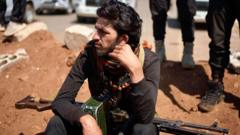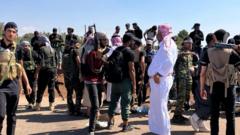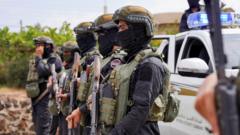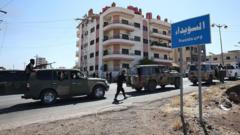Eyewitness accounts and medical staff reveal horrific events at Suweida National Hospital, where Syrian government troops allegedly targeted patients amid escalating violence against the Druze community.
Allegations of a Massacre at Suweida Hospital Amidst Syrian Sectarian Clashes

Allegations of a Massacre at Suweida Hospital Amidst Syrian Sectarian Clashes
Disturbing reports emerge from Suweida province, Syria, where government forces are accused of killing patients in a hospital during sectarian violence.
In the latest reports from Suweida City, Syria, a wave of violence has culminated in shocking allegations of a massacre at the National Hospital. Eyewitnesses and medical workers claim Syrian government forces executed patients in their beds amid escalating sectarian clashes in the Druze-majority province.
A repugnant atmosphere envelops the hospital, with the smell of death lingering in the air as corpses lie wrapped in plastic bags across the parking lot. According to Dr. Wissam Massoud, a neurosurgeon at the facility, what transpired was nothing short of a massacre. "The soldiers came here saying they wanted to bring peace, but they killed scores of patients from the very young to the very old," he detailed amidst the chaos.
Disturbing evidence surfaced in a video shared by Dr. Massoud, which captures the immediate aftermath of the raid. Graphic images show deceased patients laying in blood-soaked sheets throughout the hospital wards. Volunteer Kiness Abu Motab lamented that the victims were targeted simply for belonging to a minority group. "What is their crime? Just for being a minority in a democratic country?" he questioned vehemently.
The context of these atrocities is steeped in the ongoing conflict between various factions in Syria, each blaming the others for committing heinous acts against civilians. Reports indicate that over 300 people may have been killed during the government's operation in the hospital, though this figure remains unverified.
The Syrian defense ministry acknowledged the allegations, describing them as "shocking violations" committed by individuals clad in military uniforms. Meanwhile, the Syrian Minister for Disaster Management and Emergency Response, Raed Saleh, assured that all claims of atrocities will undergo thorough investigation.
Access to Suweida City has been tightly controlled, significantly hampering efforts to gather firsthand accounts and evidence of the events. Observations indicate that the city appears engulfed in turmoil, with remnants of destruction evident in the form of burned shops and crushed vehicles lining the streets.
Among the survivors, eight-year-old Hala Al Khatib's story stands out as particularly harrowing. After suffering a severe gunshot wound to the head while hiding at home, she now sits bandaged and traumatized, ignorant of the fact that both her parents have been killed.
As various factions continue to vie for control and blame each other for atrocities, the international community watches closely, with the UN citing credible evidence of summary executions in the ongoing conflict. The situation in Suweida remains dire, casting a shadow on the plight of the Druze community amidst this humanitarian crisis.





















